
| This Week’s a.i. Stock Spotlight is SoundHound A.I. ($SOUN) |
SoundHound AI (NASDAQ: SOUN) has emerged as a leader in the voice A.I. space, blending impressive growth with cutting-edge technology. However, as its valuation soars, traders and investors are scrutinizing its financial health, market diversification, and long-term viability. Let’s break it down.
SoundHound AI specializes in advanced voice recognition and conversational A.I. technology, enabling businesses across industries to integrate natural, intuitive voice interactions into their products and services. Its solutions, including the Houndify platform, Smart Answering, and Dynamic Drive-Thru systems, empower seamless communication between humans and technology in automotive, hospitality, healthcare, and more.
SoundHound AI is quietly building an empire in the voice A.I. world, with its proprietary Houndify platform supporting 25 languages and securing over 250 patents that cement its innovative edge. The company’s reach is staggering — powering over 10,000 restaurant locations through its recent SYNQ3 acquisition, working with giants like White Castle and Jersey Mike’s. Beyond hospitality, its purchase of Amelia has brought hundreds of enterprise clients and opened doors to the healthcare sector, where it’s now delivering AI-driven patient engagement tools. Recognized with the 2023 Automation & Self-Service Award for “Best Use of A.I.,” SoundHound continues to deepen its dominance through partnerships with industry heavyweights like Hyundai, Mercedes-Benz, and Nvidia. Despite its roots in the auto industry, a SPAC merger in 2022 marked its evolution into a diversified AI powerhouse, driving a meteoric 1,000% rally in 2024 and positioning itself as one of the year’s top-performing stocks.
SoundHound’s products are designed to make everyday interactions with technology faster, easier, and more intuitive through advanced voice A.I.. Here’s a breakdown for someone unfamiliar with them:
Think of this as a “brain” for voice-enabled devices and apps. It allows companies to add voice recognition and conversational capabilities to their products. For example, with Houndify, you could ask your car, “Find the nearest gas station with a coffee shop,” or your phone, “What’s the weather in Paris next week?” and get immediate, accurate answers. Houndify is highly customizable, making it adaptable for industries like automotive, healthcare, and hospitality.
Smart Answering :
This is like having a super-intelligent, automated assistant for businesses. Instead of waiting on hold or navigating endless phone menus, Smart Answering uses A.I. to quickly understand and respond to customer inquiries. For instance, it could handle questions like, “What are your store hours?” or “Can I track my order?” without needing a human operator.
Smart Ordering :
Imagine placing a restaurant order by simply speaking to a virtual assistant. Smart Ordering streamlines the process by allowing customers to place, customize, and confirm orders using voice commands. Whether it’s ordering a pizza or customizing a coffee, the system makes it seamless and error-free.
Dynamic Drive-Thru Solutions :
This technology brings voice A.I. to drive-thru lanes at fast-food restaurants. Instead of shouting into a static speaker and hoping the cashier gets your order right, you speak to an intelligent A.I. assistant that understands your requests clearly, even if you make changes or have a complex order. It’s designed to make the experience faster and more accurate for both customers and businesses.
In short, these products use voice A.I. to make interactions with technology and businesses more natural, efficient, and engaging.
SoundHound’s revenue growth is undeniable. In Q3 2024, the company reported a record $25.1 million in revenue, marking an 89% year-over-year increase. Yet, losses are piling up — its Q2 2024 GAAP net loss hit $37.3 million, significantly higher than $23.3 million a year earlier. This underscores the challenge of balancing rapid expansion with profitability.
Notably, SoundHound’s business model relies heavily on its proprietary Houndify platform, which supports voice A.I. in 25 languages. This multilingual adaptability has been instrumental in driving growth across sectors, but the question remains: can the company scale efficiently enough to achieve its profitability target by 2025?
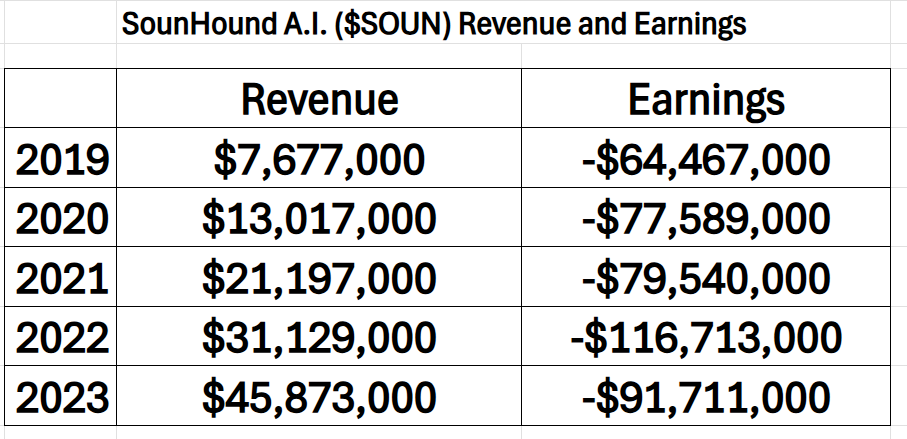
When you study their revenue and earnings over the past 5 years you can quickly see that revenue has grown 498%. While this has impressed Wall Street Analysts, the fact remains that the company is not profitable and has lost $430 million over the same time frame. Analysts are very excited that 2024 posted less of a loss than 2023 and this catalyst is responsible for creating the narrative that the company has turned the corner and profitability is within reach.
SoundHound AI has been on a meteoric rise, delivering jaw-dropping gains over the past year. But here’s the rub: this high-flyer comes with a hefty price tag. Right now, SoundHound trades at an eye-popping 109 times sales — far from its more grounded price-to-sales ratio of 12 just a year ago. Back then, its valuation seemed justifiable, bolstered by phenomenal growth. But today, those looking for their next millionaire-maker stock might want to think twice before chasing SoundHound at these lofty levels.
The stock is riding high on a wave of speculative momentum, part of a broader rebound for meme stocks and high-growth plays. Investors appear undeterred by recent market volatility, and bullish sentiment from Wall Street analysts is pouring fuel on the fire.
H.C. Wainwright’s Scott Buck has doubled down on his optimism. Buck reiterated a “buy” rating on SoundHound and jacked up his price target from $8 to $26, implying another 27% upside even after the stock’s remarkable surge. While acknowledging the role of market excitement in the stock’s climb, Buck believes the company has the chops to support its growth-heavy valuation over the long haul.
SoundHound is a high-growth story, but with its valuation sky-high, traders must weigh the speculative nature of the stock. While the company has strategically positioned itself as a leader in voice A.I., challenges like profitability, integration costs, and competitive pressure loom large.
For those who believe in the transformative potential of voice A.I., SoundHound might be worth the premium. For others, it could be a stock to revisit once the numbers align with the narrative. Either way, SoundHound is a name to watch as it shapes the next chapter of A.I. innovation
SoundHound’s success story is impressive, but it’s also a reminder of the risks tied to speculative stocks with sky-high valuations. The recent rally underscores the power of investor enthusiasm, but at these levels, caution might be the smarter play for those considering whether to jump aboard this soaring A.I. rocket.
In this stock study, we will look at an analysis of the following indicators and metrics which are our guidelines, and which dictate our behavior in deciding whether to buy, sell or stand aside on a particular stock.
- Wall Street Analysts Ratings and Forecasts
- 52 Week High and Low Boundaries
- Best-Case/Worst-Case Analysis
- Vantagepoint A.I. Predictive Blue Line Indicator
- Neural Network Forecast (Machine Learning)
- VantagePoint A.I. Daily Range Forecast
- Intermarket Analysis
- Our Suggestion
While we make all our decisions based upon the artificial intelligence forecasts, we do look at the fundamentals briefly, just to understand the financial landscape that $SOUN is operating in.
Wall Street Analysts Forecasts

Looking ahead, analyst projections for $SOUN over the next 12 months suggest an average price target of $14.36, with estimates ranging widely from a low of $6.00 to a high of $26.00. These forecasts paint a mixed picture, as the high-end target signals optimism for continued growth in AI adoption, while the lower estimates indicate caution over the company’s lofty valuation and profitability challenges. Traders should weigh these divergent views carefully, as the current price exceeds the average target, underscoring both the potential opportunity and inherent risks tied to SoundHound’s evolving narrative.
We always advise traders to pay close attention to the variance between the most bullish and bearish forecasts as this is the amount of Expected Volatility that Wall Street is anticipating for the stock. Currently this variance is $20 or 101% of the current price. This is exceptionally high and provides us with a perspective of cautiousness as we begin our analysis.
52 Week High and Low Boundaries

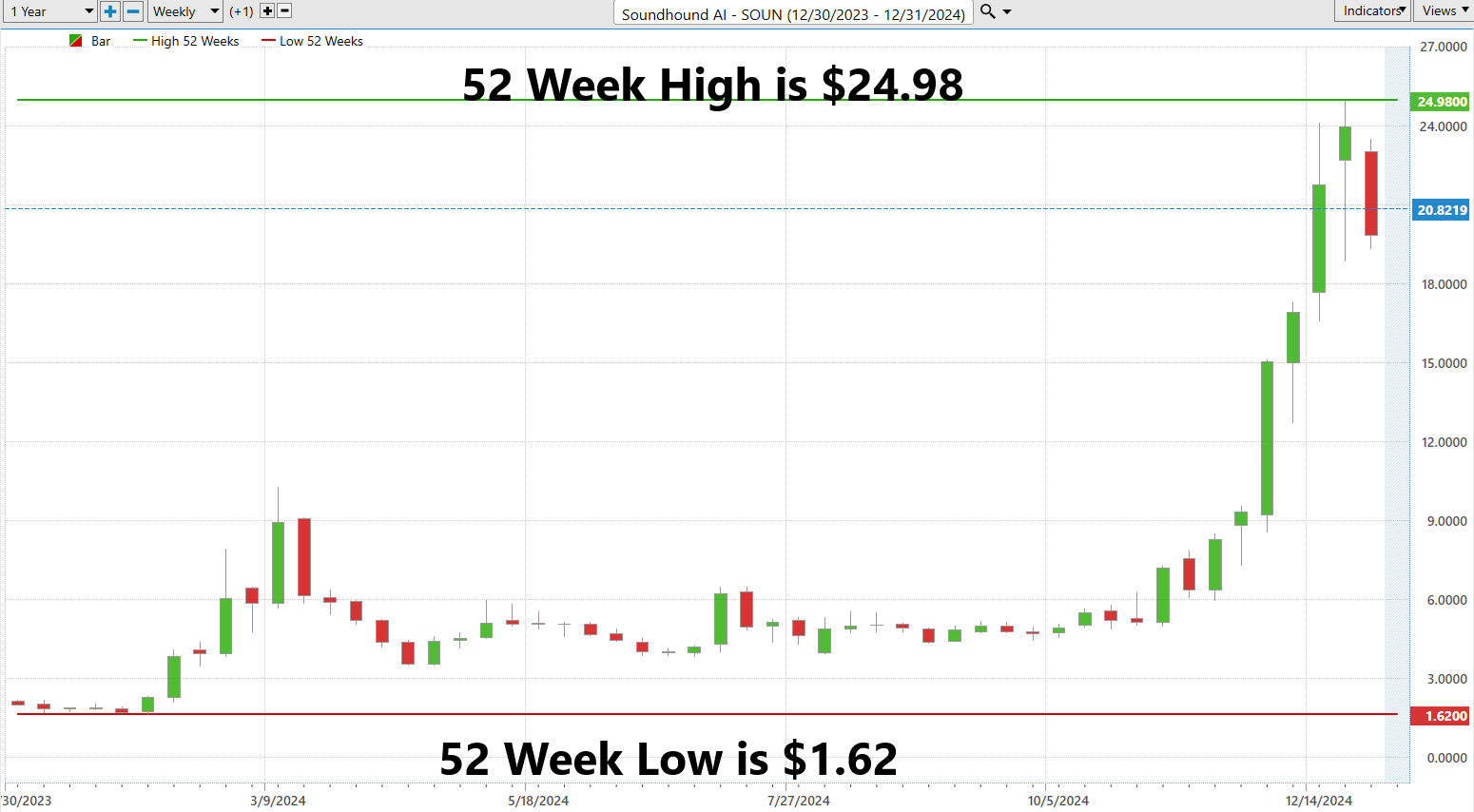
SoundHound AI (NASDAQ: SOUN) has traded between a 52-week low of $1.62 and a high of $24.98, showcasing the stock’s dramatic volatility and explosive growth over the past year. These boundaries provide a snapshot of the stock’s performance range, highlighting both its lowest point during market downturns and its peak during periods of high investor enthusiasm. This perspective helps traders gauge the stock’s historical resilience, its reaction to broader market conditions, and its potential for future price movements, offering valuable context for making informed decisions.
Best-Case/Worst-Case Analysis
SoundHound AI (NASDAQ: SOUN) has traded between a 52-week low of $1.62 and a high of $24.98, showcasing the stock’s dramatic volatility and explosive growth over the past year. These boundaries provide a snapshot of the stock’s performance range, highlighting both its lowest point during market downturns and its peak during periods of high investor enthusiasm. This perspective helps traders gauge the stock’s historical resilience, its reaction to broader market conditions, and its potential for future price movements, offering valuable context for making informed decisions.
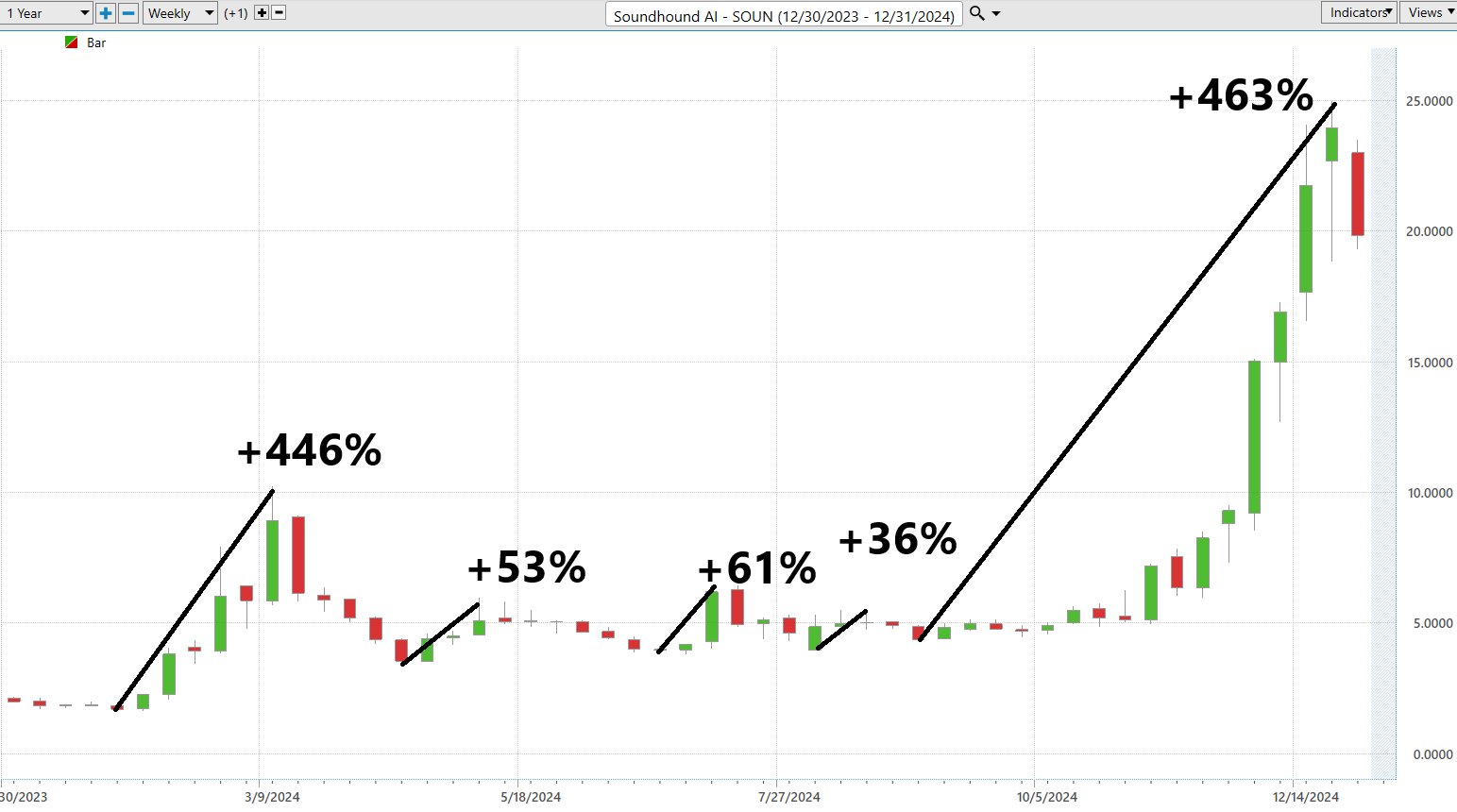
Followed by the worst-case scenario where we measure the largest uninterrupted declines.
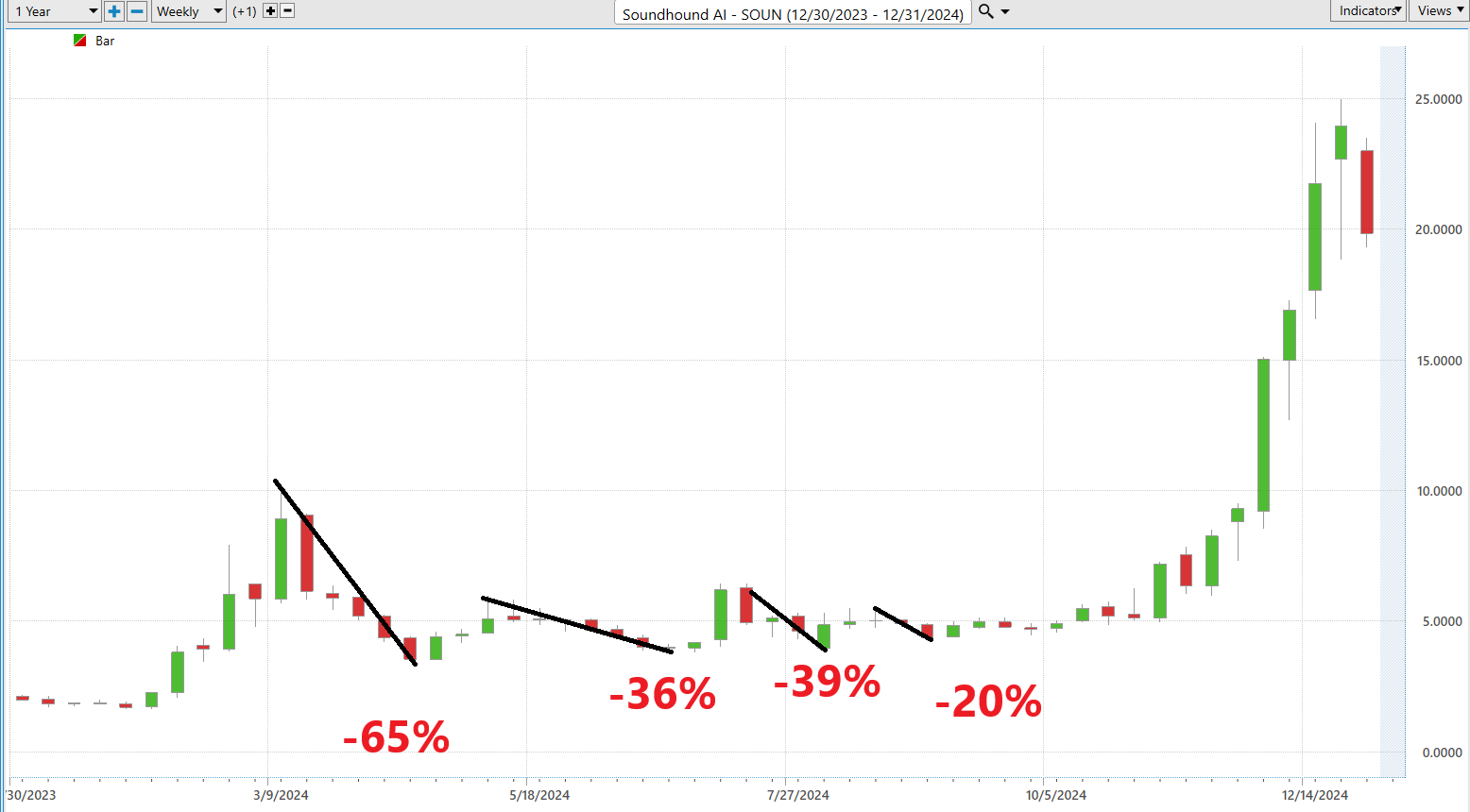
This straightforward exercise gives traders a clear, side-by-side view of two charts that not only highlight the potential rewards but also lay bare the inherent risks.
Such a comparative analysis is essential for navigating the turbulent waves of $SOUN’s price movements and the broader global market volatility. It provides the kind of informed precision that separates savvy traders from the rest — practical, focused, and indispensable for those looking to stay ahead in today’s dynamic financial landscape.
Next, we compare $SOUN to the broader stock market indexes.

The volatility in $SOUN is unmistakable in this graphic, providing a clear visualization of the significant swings both to the upside and the downside. This snapshot highlights the stock’s dramatic price movements, offering valuable insight into the scale and impact of its market fluctuations.
$SOUN sports a beta of roughly 3.03, and here’s why that matters: in the world of trading, beta is your volatility compass. It measures how wild a stock swings compared to the overall market, which is usually anchored to the S&P 500 at a baseline beta of 1.
With a beta above 1, a stock is more volatile than the market, and $SOUN’s 3.03 beta cranks up the dial. In simple terms, if the market moves up 1%, SoundHound AI might soar by 3%. But don’t get too comfortable — if the market dips 1%, this stock could plunge by 3%.
This kind of amplified volatility isn’t for the faint-hearted. It’s both an opportunity and a risk, demanding traders come prepared for sharper price swings and more dramatic moves. If you’re stepping into $SOUN, buckle up — it’s a fast ride with the potential for big rewards and equally big risks.
Vantagepoint A.I. Predictive Blue Line
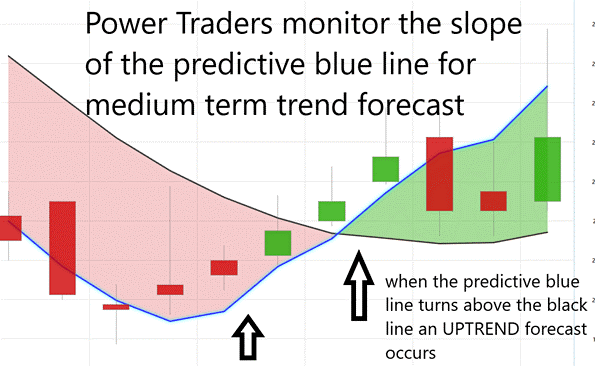
Step into the world of VantagePoint Software’s A.I.-driven forecasts for $SOUN, where the predictive blue line takes center stage. This isn’t just another chart feature; it’s a sophisticated blend of artificial intelligence and market insight, designed to pinpoint the future trajectory of $SOUN’s stock price with remarkable precision.
Think of the predictive blue line as your roadmap through the unpredictable terrain of trading:
- Spot the Slope : The direction of the blue line holds the key. An upward slope often signals potential price increases, while a downward slope can suggest the stock is gearing up for a drop. Observing these shifts can help traders anticipate the next move.
- Value Zone Awareness : This is where opportunities and risks intersect. If $SOUN’s stock price approaches or dips below the blue line during an upward trend, it could indicate a buying opportunity. Conversely, when the price crosses above the line in a downward trend, it might be time to consider selling and reallocating.
- Downward Slope Signals : A declining blue line is a clear warning that prices may fall. This insight enables traders to proactively adjust their positions, whether by selling off or hedging against potential losses.
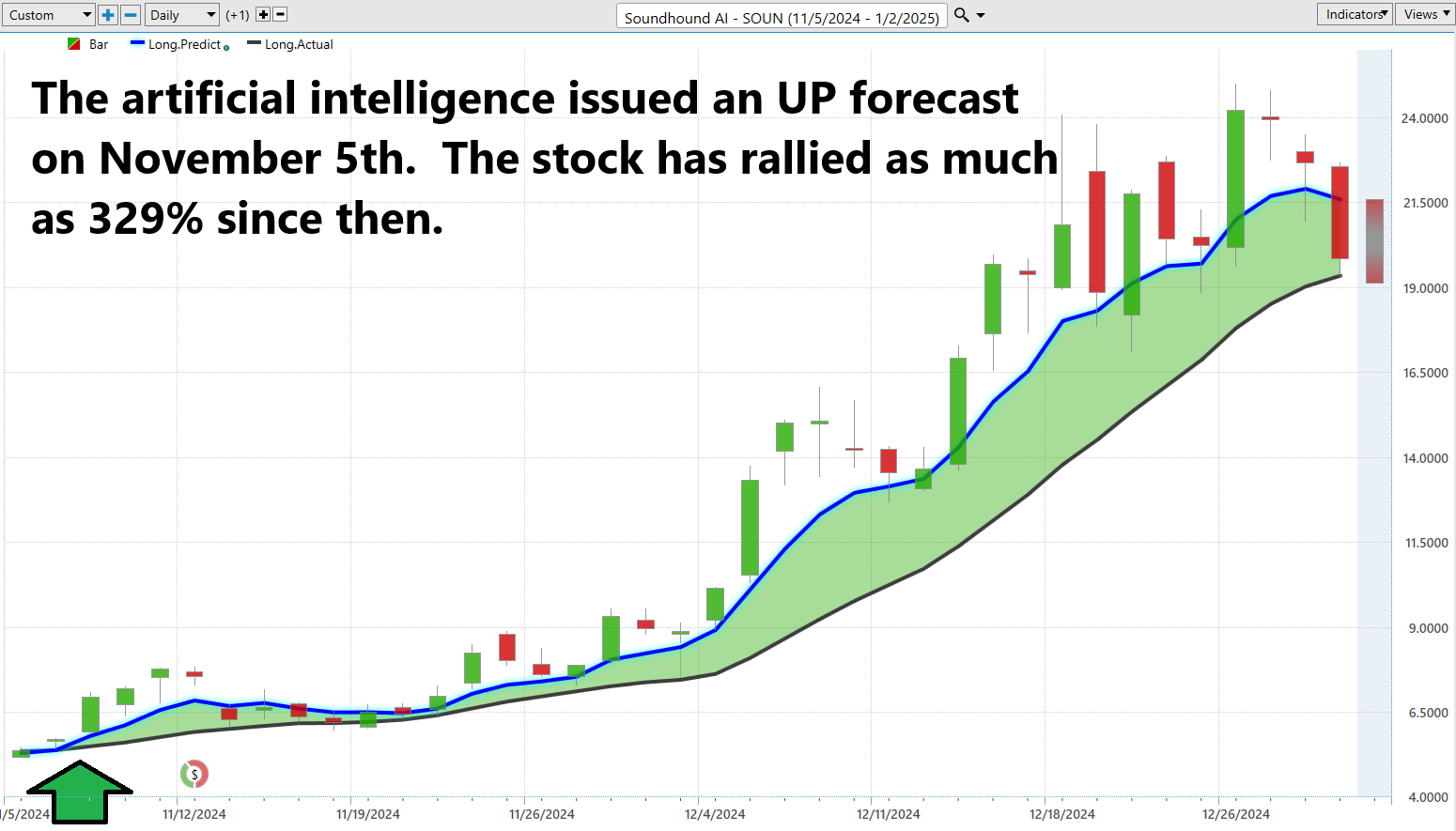
By leveraging the predictive blue line, traders can navigate market volatility with confidence. It’s more than a tool for tracking; it’s a strategy for anticipating market movements and staying ahead of the curve. In the fast-paced trading world, VantagePoint gives you a distinct edge, transforming raw data into actionable insights that empower smarter decisions.
Neural Network Forecast (Machine Learning)
A neural network for traders is like having a high-powered, always-learning assistant that processes mountains of market data to uncover patterns the human eye might miss. Think of it as a brain built for trading — designed to recognize trends, correlations, and signals across price movements, volumes, and other indicators, all in real time.
This advanced A.I. system mimics how our brains learn by analyzing past data and constantly refining its predictions. For traders, that means sharper insights into potential market moves, better timing on entries and exits, and a clearer sense of where the risks and opportunities lie.
Here’s the real magic: a neural network doesn’t just look at one stock or one factor — it’s analyzing the broader market ecosystem, factoring in global trends, sector dynamics, and even economic shifts. By turning complex, chaotic market data into actionable forecasts, it helps traders make faster, smarter decisions and stay ahead in a game where minutes can mean everything. In short, it’s like adding a turbocharged, market-savvy teammate to your trading arsenal.
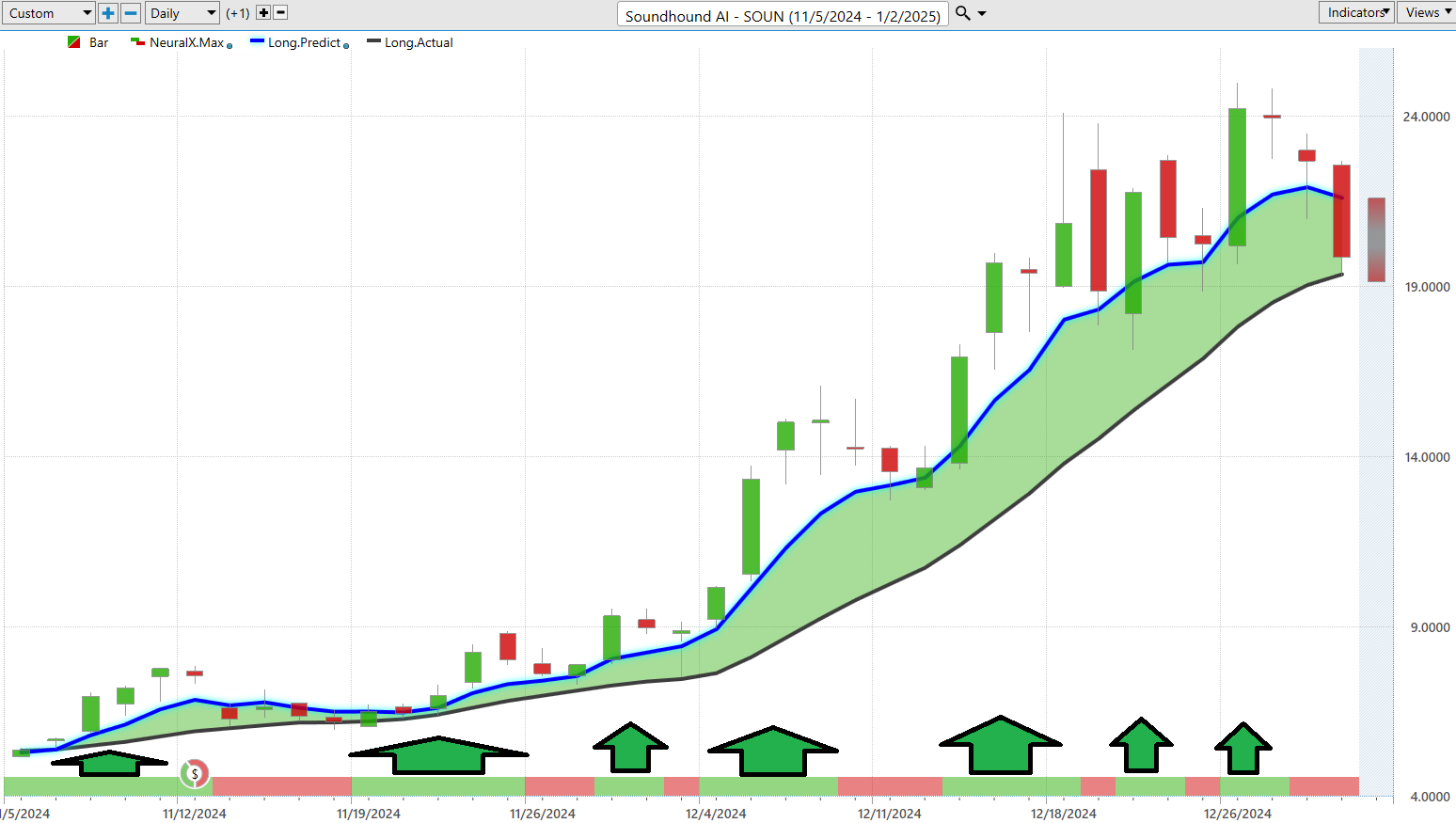
As you study the Neural Index graphic above observe how the moments when the Neural Index turns red is when the price retraces to the value zone of the predictive blue line. This is a powerful combination for embracing volatility.
Neural networks are revolutionizing trading by offering lightning-fast processing, exceptional accuracy, and the ability to continuously adapt and improve. They minimize human error while delivering precise forecasts, keeping traders in sync with market shifts through real-time updates.
For traders eyeing $SOUN, these insights provide a powerful, systematic approach to anticipating price movements, turning the chaos of market fluctuations into actionable strategies.
VantagePoint A.I. Daily Range Forecast
In trading, timing isn’t just important, it’s the heartbeat of profitability. For Power Traders, the VantagePoint A.I. Daily Range Forecast isn’t just another tool; it’s a game-changer. It sharpens their decision-making, helping them pinpoint the exact moments to enter or exit trades — decisions that define their success in the fast-paced world of finance.
Volatility is more than a feature of the market; it’s the constant backdrop every trader must navigate. But in today’s intricate and unpredictable markets, raw data isn’t enough. To gain a true edge, that data must be transformed into actionable insights. That’s where artificial intelligence, machine learning, and neural networks come into play—not as buzzwords, but as essential tools that cut through the noise and deliver precise, actionable predictions.
Here are the average trading ranges for $SOUN over the past year for the daily, weekly and monthly time frames:

Understanding volatility is just one piece of the trading puzzle. The real key is getting your timing right — knowing exactly when to jump in or out of the market. That’s where VantagePoint’s A.I. Daily Range Forecast comes in. It’s not just another charting tool; it’s a guide for short-term swing traders, mapping out daily price movements with impressive accuracy. In trading, precision isn’t a bonus, it’s a must.
This cutting-edge tool digs into the details of every trading session, giving traders a clear roadmap to navigate the day’s ups and downs and spot critical opportunities. Look at the chart below — notice how the trend lines and projections pop out? It’s not just visually striking; it’s a powerful example of how this tool delivers the insights traders need to make smarter, more strategic moves.
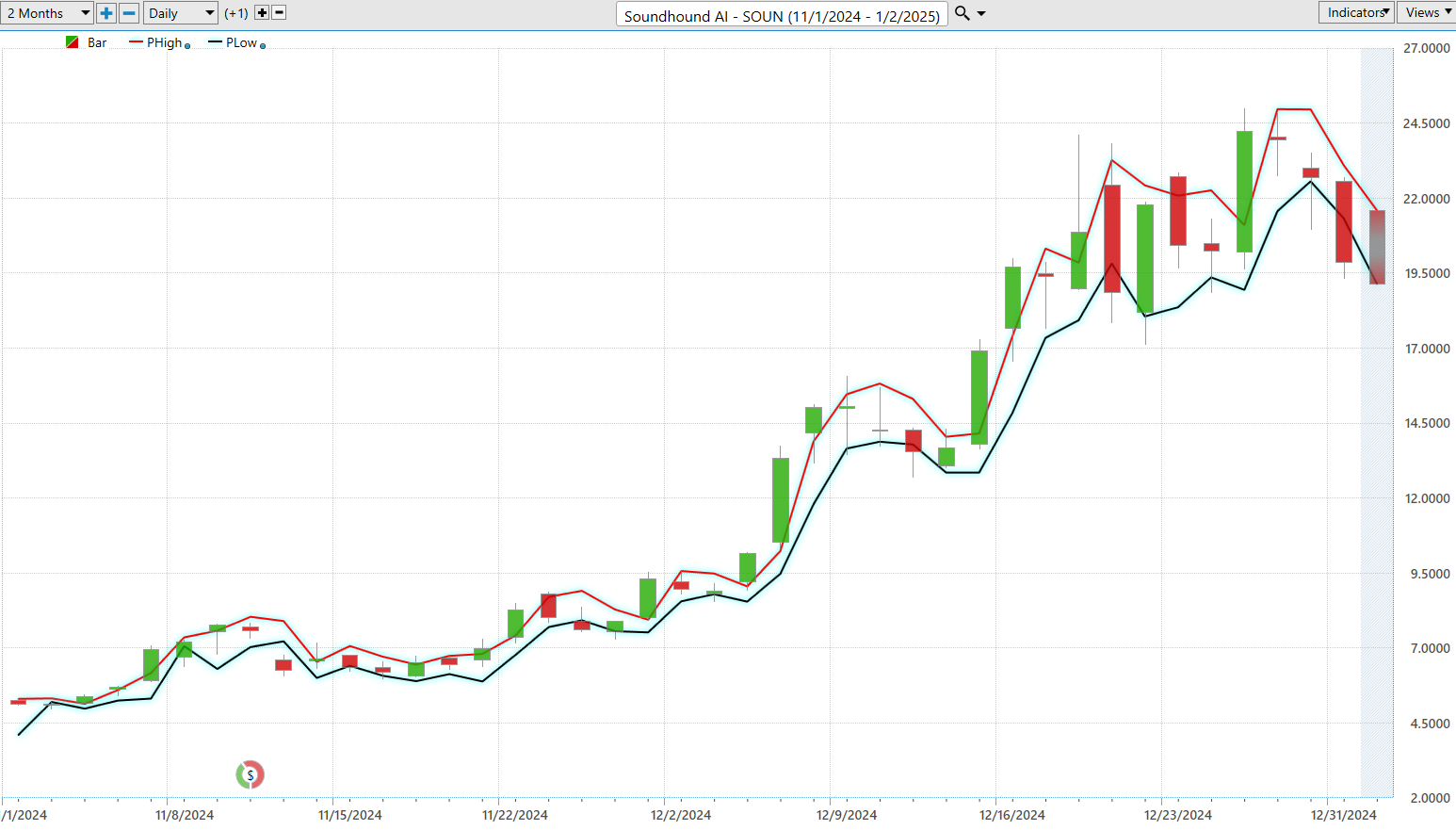
Intermarket Analysis
Intermarket analysis is like stepping back from the noise of individual stocks and seeing how all the pieces of the financial puzzle connect. It’s about understanding the relationships between different markets — like stocks, bonds, commodities, and currencies — and how they influence each other. For example, rising oil prices might boost energy stocks but put pressure on transportation companies. By studying these connections, traders can anticipate market moves and stay ahead of the game.
The pioneers of intermarket analysis include legends like John Murphy, who literally wrote the book on it (“Intermarket Technical Analysis”), and Martin Pring, who brought the concept to life with his practical insights. These trailblazers showed how global markets interact, giving traders a framework to predict trends more effectively. Louis B. Mendelsohn, the founder of VantagePoint A.I., created the software process to make Intermarket analysis a practical and useable tool for traders.
For traders, intermarket analysis is a game-changer. It helps you spot opportunities and avoid traps by understanding how one market’s movements ripple through others. Instead of flying blind, you can trade with a clear sense of how bonds might impact stocks, or how the U.S. dollar could influence commodities. It’s like having a cheat sheet for market behavior, giving you the edge to make smarter, more informed trading decisions.
Here are the 31 key drivers of price for $SOUN.
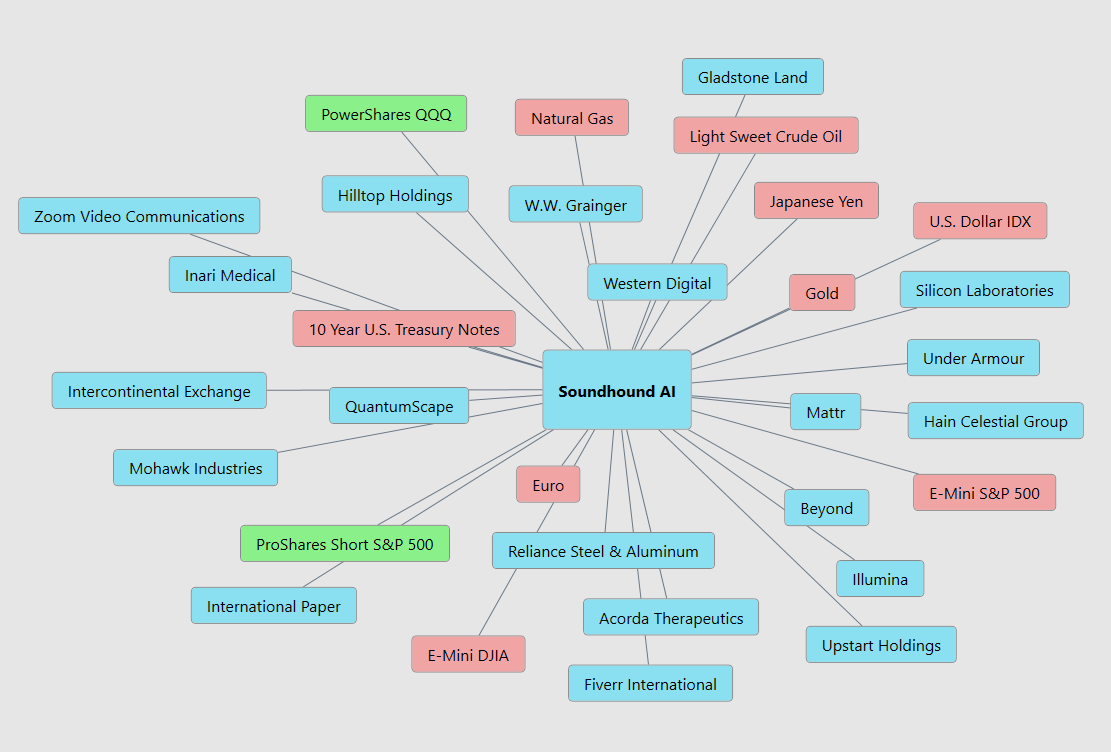
Our Suggestion
SoundHound AI is on a robust growth trajectory, with consecutive quarters of substantial revenue increases and strategic expansions into new markets. The acquisition of Amelia and partnerships in the automotive sector position the company as a formidable player in the AI industry. However, the decrease in gross margin to 49% in Q3, attributed to recent acquisitions, suggests that while growth is strong, maintaining profitability will require careful management. Investors should monitor how effectively SoundHound integrates its acquisitions and manages operational costs to sustain its upward momentum.
In summary, SoundHound AI’s recent earnings reports reflect a company capitalizing on the growing demand for AI solutions, with impressive revenue growth and strategic partnerships. The focus now shifts to maintaining this growth while improving profitability and operational efficiency.
Investors need to recognize that the company is trading at 109 times sales which is among the loftiest valuations I’ve ever encountered.
Our suggestion is for traders to place $SOUN on the your watchlist as it could create numerous trading opportunities over the coming year. Our expectation is that the market is due for a retracement, and we will continue to rely upon our daily range forecast for short-term trading opportunities.
The next $SOUN earnings call is scheduled for February 28, 2025.
Practice good money management on all of your trades.
It’s not magic.
It’s machine learning.
Let’s Be Careful Out There.
Disclaimer: THERE IS A HIGH DEGREE OF RISK INVOLVED IN TRADING. IT IS NOT PRUDENT OR ADVISABLE TO MAKE TRADING DECISIONS THAT ARE BEYOND YOUR FINANCIAL MEANS OR INVOLVE TRADING CAPITAL THAT YOU ARE NOT WILLING AND CAPABLE OF LOSING.
VANTAGEPOINT’S MARKETING CAMPAIGNS, OF ANY KIND, DO NOT CONSTITUTE TRADING ADVICE OR AN ENDORSEMENT OR RECOMMENDATION BY VANTAGEPOINT AI OR ANY ASSOCIATED AFFILIATES OF ANY TRADING METHODS, PROGRAMS, SYSTEMS OR ROUTINES. VANTAGEPOINT’S PERSONNEL ARE NOT LICENSED BROKERS OR ADVISORS AND DO NOT OFFER TRADING ADVICE.

